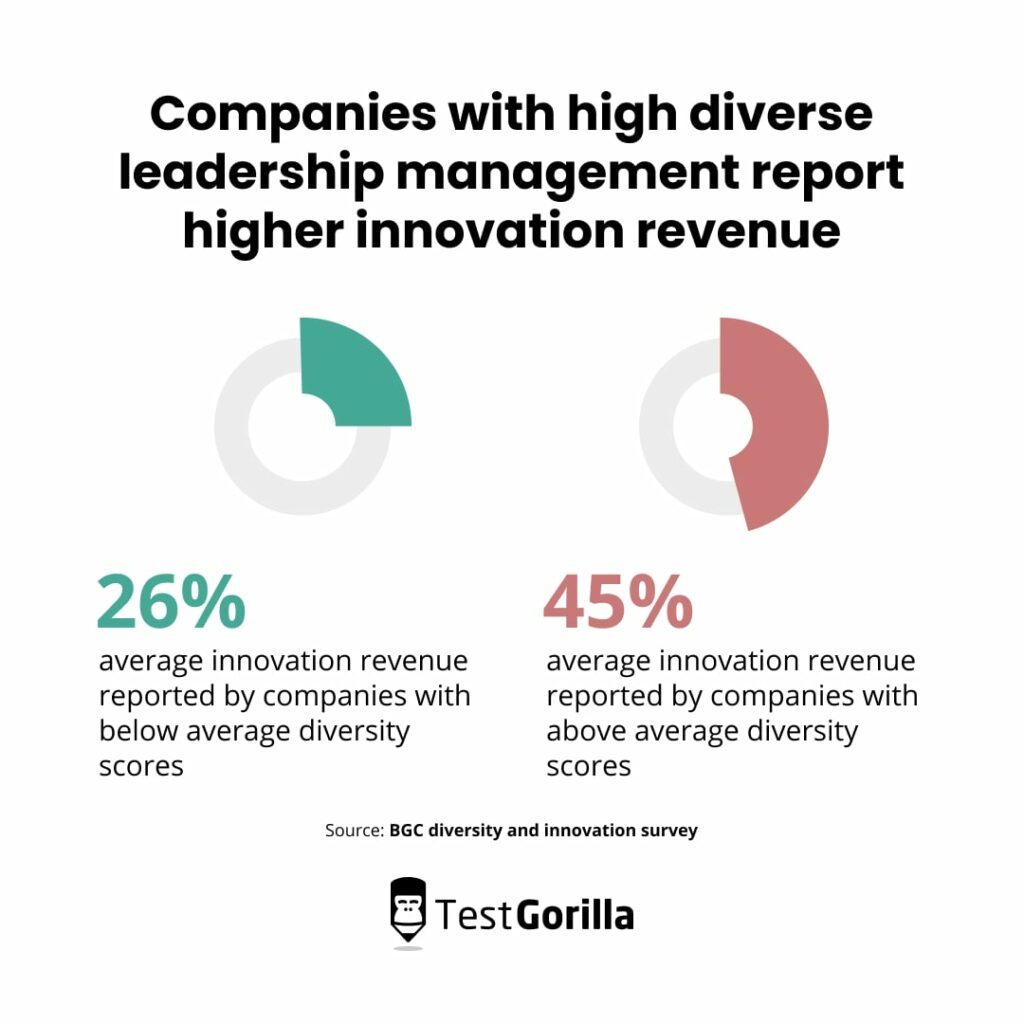Are you hiring a manager for your business? This is an important role, as the chosen candidate will be responsible for various aspects of your business. Since managers have many essential responsibilities, such as onboarding duties, overseeing staff, and diversity and inclusion training, evaluating their experience is critical.
A Leadership & People Management skills test is the perfect way to evaluate your candidates after sourcing them. However, you must also interview your applicants to test their traits more thoroughly and learn about their personalities.
The real question is: What questions will you ask them during the interview?
If you don’t know, have no fear – we’ve put together 20 management situational interview questions to ask leaders when you meet them. Read on to select all the questions you will need to ensure you hire the perfect candidate.
Table of contents
20 management situational interview questions to ask candidates
From questions about management styles to handling failure at work, here is our list of 20 management situational interview questions to ask your candidates.
1. Please describe a time when you handled an employee with a different work style to your team.
Not every employee has the same work style. Some may approach problems by researching how to solve them, while others might seek the support of their team.
Candidates in your applicant pool should know how to support team members regardless of their work style and understand the best ways to encourage productivity.
Look for applicants who understand each team member’s unique style and have the skills to tailor their management style to each individual. If they demonstrate they can understand different employees’ working styles, they might be a good candidate for your vacancy.
Ask candidates how their management methods have yielded positive results for their company or enhanced success in diversity and inclusion, asking for specific examples. This method will help you assess the effectiveness of their management styles.
2. Have you ever had to adapt to a significant change at work? How did you help your team embrace that change?
All companies and teams inevitably change over time, requiring managers to adapt and handle new responsibilities. Your candidates may have had to adapt to an expansion in their company. In this case, candidates may have implemented and embraced new software or learned how to manage new employees.
The best answers to this management situational interview question will also mention how your candidates encourage team members to adopt a flexible, problem-solving technique that aligns with the company culture and values. They should mention how they communicated with their team to ensure they understood the changes.
If your candidate and their team can handle significant changes in their role, they should also be able to handle changes in your company.
3. Please tell us about a situation when you had to motivate others.
Motivating others is a central part of a manager’s role, and candidates should have several examples of such situations to prove their experience.
For example, if they need to complete employee onboarding with a new team member, they may need to motivate them to participate in training programs. Alternatively, if they have to manage team members completing a new project, they may need to inspire them to put extra effort into the project to please their clients.
Some candidates might look at their employer’s value proposition to choose appropriate benefits and rewards, offering them to employees to motivate them.
Since motivating others requires management candidates to be motivated themselves, use our pre-employment Motivation test to evaluate this trait.
4. Can you provide an example of a time when you made a mistake at work?
Most people make between three and six errors per hour, and managers are no exception. Although candidates will inevitably make mistakes at work, the key is determining whether they learn from those errors.
Every industry has particular areas in which managers may make mistakes. Engineering managers could fail to monitor their team’s progress in a software security issue, while marketing managers might delegate technical SEO projects to an unsuitable team member.
As long as your candidate can learn from these errors or use methods to minimize mistakes, it’s worth keeping them in your talent pipeline.
5. Name a time you had to ensure your team met a deadline.
Deadlines are essential for enhancing the company-client relationship. Teams that produce high-quality work within a deadline can build client trust and satisfaction. Therefore, it helps if your candidate can coach teams to meet deadlines.
Time-management abilities, which you can assess with a Time Management skills test, are crucial for managers to achieve this goal. They should have strategies to enhance their team’s output, such as delegation and project-management skills to monitor the team’s progress.
It’s also worth evaluating your candidate’s project-management skills to determine if they can plan to ensure their team consistently meets deadlines. You can easily do this with our Project Management skills test.
6. Please describe a time you had to ensure a new employee felt included.
Inclusivity in the workplace ensures every employee feels respected and supported, no matter their identity or traits. Candidates should proved clear examples of how they promoted inclusivity with new employees.
One sign that candidates can make new employees feel included is through their inclusion training strategies and implementation of new work policies. With inclusion training, managers can educate their teams about the advantages of diverse workplaces and promote an inclusive culture.
You’re looking for candidates who understand unconscious bias, the value of hiring for culture add (rather than culture fit), and cultural competency. With these strategies, applicants can create a welcoming environment.
7. Have you ever had to make a difficult decision at work? Which approach helped you?
Most workers spend 37% of their time making decisions, many of which may be difficult. If your candidate knows how to make tough decisions tactfully, this is a good sign that they can lead teams and guide them to make productive choices.
Candidates should know that several methods can help managers make tough decisions, including:
Scheduling or creating timeboxes for decision-making
Thinking about the potential outcomes of the decision
Gathering data related to the decision
Collaborating with team members and stakeholders
Being decisive and referring to the data they collect
Consider if your candidates’ toughest decisions have had a positive impact on their company to gauge their decision-making skills.
8. You have to delegate significant tasks to your team. Explain how you would do this.
Task delegation is a crucial part of a manager’s role. It ensures that teams can handle their tasks with their best skills in the right places, helping to complete projects on time.
As such, it’s worth evaluating your applicants’ delegation skills. After sourcing candidates and inviting them to an interview, you can ask them this management situational interview question to achieve this.
Managers should know their team members as individuals and understand their best skills. This knowledge can help with task delegation and ensure candidates assign the right tasks to suitable employees. They can also provide clear instructions and set checkpoints to monitor the team’s progress.
By using our Leadership & People Management test or asking extra leadership interview questions about delegation, you can learn more about your candidates’ delegation skills.
9. Describe a situation in which you mediated and resolved an employee conflict.
Conflicts can happen at work, so a manager should be confident about handling them quickly to prevent morale from slipping. In response to this management situational interview question, candidates should provide examples of conflicts they have resolved.
For example, a senior software tester engineer or maintainer might not approve of their team’s debugging methods, which could lead to a disagreement with other employees. However, it’s down to the engineering manager to use conflict-resolution skills and communicate with the team to handle the situation.
Conflict management is also crucial for helping teams remain productive. Since communication is fundamental to conflict resolution efforts, ensure you use our free Communication skills test to assess your applicants’ active listening and verbal communication skills.
10. Please describe a time when you went above and beyond to enhance your team’s productivity.
Productivity is crucial for a company to increase revenue and brand reputation. Hiring a manager who can enhance their team’s productivity is essential, so consider if your applicants have strategies and examples of how they achieved this.
One factor that contributes to productivity in the workplace is worker satisfaction. Contented workers are 13% more productive, so managers should emphasize the importance of a good work-life balance for productivity.
Employees must also have the right resources and training available to improve their skills and enhance their output. Don’t forget to ask for evidence of how effective your candidate’s efforts were, such as statistics about their company’s resulting performance – as always, specific examples are revealing.
11. Please give us an example of a situation when you had to prioritize several projects or tasks simultaneously.
To manage multiple projects at once, managers need excellent time-management skills. They should have clear methods and be able to provide examples of previous occasions where their time-management skills helped them prioritize their projects.
For example, if a managing editor has to proofread 10 articles quickly, they may delegate this task and ask senior editors to complete some of the work.
If you need more facts about how they prioritize tasks, ask candidates if they have experience delegating in a fast-paced organization – this may be a sign that they can handle the challenges your organization faces.
12. Name a time you were dissatisfied with your work. How did you handle it?
It’s impossible to perform perfectly all the time, so it is inevitable that managers will occasionally be dissatisfied with their work. For instance, they may be unhappy with their employee monitoring efforts or team coaching work or feel that they have not reached their full potential on a particular project. Despite this, they should find ways to improve.
Make sure your candidates can implement techniques to improve their work. For example, some managers might use pre-employment skills testing to monitor their employee’s abilities. They can use the test results to determine which training programs they need to prepare, helping to coach their employees.
13. Please tell us about a situation where you noticed a problem. How did you fix it?
Solving problems is an essential part of management that requires critical thinking and innovative ideas. Candidates who want to be your company’s next manager should have plenty of problem-solving experience and examples to show this.
For instance, a manager might need to enhance the company-customer relationship using perks or unique strategies. To handle this problem, they could:
Provide value-added services
De-escalate issues between customers and the company
Build good relationships by understanding the customers’ needs
Offer top customer service
Experts emphasize that managers should know how to analyze a given situation and select the best course of action. Therefore, when you create a job description, you should specify that you’re looking for a manager with those problem-solving skills.
Once you’ve sourced applicants, send them a Problem Solving skills test to assess their problem-solving methods.
14. Have you ever had a heavy workload? Explain how you handled the situation.
Many managers have heavy workloads that require them to juggle several tasks. Your candidates should have a strategy to handle their responsibilities without getting stressed. You should check which strategies your candidates use during the talent acquisition and interview phase.
Their approach might differ depending on the industry in which they work. For instance, a content manager might find it easy to power through their articles using the Pomodoro technique, while a software engineering manager may use timeboxing approaches to manage their work.
On the other hand, a managing receptionist may use calendars to organize their time effectively.
Check the effectiveness of these methods by asking about your candidates’ average output and whether they could meet specific targets.
15. Please describe a situation in which you failed at work. What did you learn?
No manager is perfect, and everyone will occasionally fail at work. The key thing to consider is whether your candidate learned from the failure.
From providing unbalanced feedback and delegating tasks incorrectly to micromanaging and demotivating employees, there are many circumstances when candidates might feel that they have made a mistake.
However, candidates who can learn how to provide negative and positive feedback, understand more about the team’s strengths before delegating, and trust their team to perform their best without pressuring them are those you should consider for your company.
16. Name a time you required data from your team but they were slow to respond.
Receiving information from a team about projects or progress is important for managers because it can help them make decisions and monitor tasks effectively. However, this process can be challenging, and it can hinder progress if team members respond slowly.
It’s important to consider if candidates know how to get the data they need while avoiding micromanaging their team. One approach involves arranging virtual coffee chats or team meetings to catch up with the team. More chances to speak with team members can help managers get answers faster.
17. Please describe a time you had to lead a project. Which factors made it a success?
Managers should be used to leading projects, whether it is an editorial project or a marketing task. The top candidates will be able to describe a situation in which they led a project with positive outcomes.
For example, a managing editor might ensure all articles are error-free before recommending graphics and sending the batch to the uploader for publishing.
In their answers, you’re looking for the factors that made the project successful. In the case of the managing editor, they may have achieved success due to the consistent feedback they provide their writers.
18. Please tell us about your leadership approach when managing diverse teams.
Since studies show that diverse teams can create 19% more innovation revenue than non-diverse teams, finding a manager who encourages diversity and inclusion is worth the time and effort. This approach, alongside effective leadership, can help you yield these benefits.
Candidates should manage diverse teams by:
Getting to know each individual on the team
Being inclusive and celebrating differences
Promoting communication and establishing communication rules to ensure all individuals understand each other
Diversity and inclusion training can also help teams adopt the company’s cultural values and accept and learn from differences within the team. Ensure you check whether your candidates have such experience before hiring someone.
19. Name a time you had to give your team feedback. Did your team improve afterward?
Offering feedback to a team can improve your team members’ work quality and help satisfy clients. However, it’s not always easy for managers. When providing feedback to a team, leaders should remember to:
Remain objective and empathetic
Provide clear examples of how the team member can improve
Offer support and coaching
Suggest ways the team member can learn new skills
Mention the good aspects of their work
Encourage the team member to ask questions
It’s always a good sign if your candidate’s team can provide better quality work after receiving their feedback. Don’t be afraid to ask for proof that shows the positive outcomes of your candidate’s feedback – this will be a testament to your applicant’s managerial expertise.
20. Tell us about a situation in which you convinced your team to consider your perspective.
Leaders should be influential coaches who can guide their teams with insightful ideas. The best applicants can convince their team to consider their perspective, particularly if it can enhance their work.
For example, managers coaching potential leaders might provide insights about assertiveness when leading a team. They may suggest that communication is essential for leaders and explain that it helps them establish clear objectives for their team.
Check whether your candidates can persuade their team by asking them more about their experience or asking them to complete a Negotiation skills test.
Recommended reading: 36 behavioral interview questions for managers (+ answers to look for)
How should you use the Leadership and People Management test with management situational interview questions?
The most effective way to use the Leadership & People Management test with management situational interview questions is to use the test first as part of a more comprehensive assessment. Once you have your candidates’ results, you can use these to target the best performers.
You can then select the best managers for the interview stage and ask your candidates some of our management situational interview questions to discover more about them.
Hire expert leaders with management situational interview questions and tests
To avoid lengthy time-to-hire metrics when hiring a leader, you’ll find no more efficient hiring methods than combining skills tests and management situational interview questions.
We recommend our cognitive ability and Leadership & People Management tests for an easy candidate assessment method.
If you want to learn more about skills tests, try TestGorilla for free to see how they work and discover why they’re the best data-driven method that more than 9,000 companies trust.
Use skills tests and management situational interview questions to hire the most experienced managers for your team and company.
Related posts
Hire the best candidates with TestGorilla
Create pre-employment assessments in minutes to screen candidates, save time, and hire the best talent.
Latest posts
The best advice in pre-employment testing, in your inbox.
No spam. Unsubscribe at any time.

Hire the best. No bias. No stress.
Our screening tests identify the best candidates and make your hiring decisions faster, easier, and bias-free.
Free resources
This checklist covers key features you should look for when choosing a skills testing platform
This resource will help you develop an onboarding checklist for new hires.
How to assess your candidates' attention to detail.
Learn how to get human resources certified through HRCI or SHRM.
Learn how you can improve the level of talent at your company.
Learn how CapitalT reduced hiring bias with online skills assessments.
Learn how to make the resume process more efficient and more effective.
Improve your hiring strategy with these 7 critical recruitment metrics.
Learn how Sukhi decreased time spent reviewing resumes by 83%!
Hire more efficiently with these hacks that 99% of recruiters aren't using.
Make a business case for diversity and inclusion initiatives with this data.



















